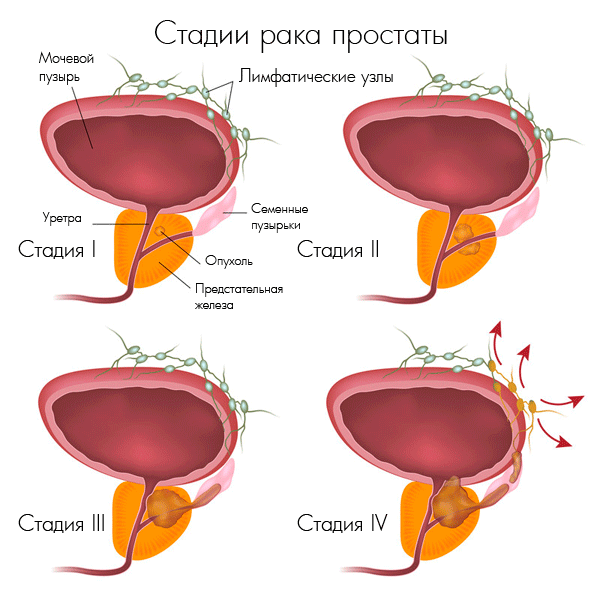Prostate cancer is a malignant neoplasm resulting from the pathological proliferation of the secretory epithelium of the prostate. According to medical data, microscopic examination of prostate tissue reveals cancer cells in one of twelve young people aged 20-30 years, every second male who has crossed the 70-year-old line, and practically in all patients, whose age exceeds 90 years. At the same time, 10% of male deaths due to oncological diseases occur in patients with prostate tumors. Is it possible to avoid the appearance of a serious illness, how to recognize the development of a tumor at its early stage - and what are the prospects for a cure if you are diagnosed with prostate cancer?

The main causes of the disease
Prostate is a gland of small size, located around the urethra under the bladder. Supporting the vital activity of spermatozoa and contributing to their ejection during ejaculation, the prostate plays one of the primary roles in the reproductive function of men. Prostate cancer develops in cases where the gland tissue degenerates into a malignant neoplasm.
Science has not yet identified certain causes of prostate cancer. It is known only that the disease is a consequence of pathological changes occurring in the DNA of the cells of the prostate gland. The main reason for such changes is considered to be the age factor: it is known that in the category of men under 40 years of age the disease is extremely rare, and after 50 years the risk of getting into the number of cancer patients increases every year.
Another risk factor is hereditary. Special studies show that the presence of malignant neoplasm of the prostate gland in a man doubles the probability of the disease in his blood relatives.
In addition to the above factors, among the main reasons for the development of oncology of the prostate are physicians called race( it is noted that diseases are most susceptible to representatives of the Negroid race), as well as excessive consumption of fat, smoking and work in hazardous industries.
Symptomatic and destructive effect of the disease at its different stages
Prostate cancer has 4 stages of development. At the first stage, it proceeds almost asymptomatically, and is usually detected accidentally, during a medical examination.
Initial symptoms of a malignant tumor usually begin to manifest itself in the second stage of the disease. During this period, patients have a violation of urination, without other obvious signs of developing disease. Rectal examination can reveal the formation of a dense node in the prostate gland. In this case, the patient is assigned a biopsy for an accurate diagnosis. The formation of metastases in the second stage is unlikely.

The third stage of oncological disease of the prostate gland is characterized by the most severe symptoms. There is an increase in urination, hematuria. At this stage, metastases can penetrate into the seminal vesicles and organs located in the pelvic region.
In the fourth stage, the tumor grows considerably, forming metastases throughout the body, beginning with the bones and ending with the spine and internal organs.
Consequences of oncology of the prostate
Prostate cancer leads to physiological changes irreversible for male health. The impact of the disease affects both the general well-being of the patient and his life activity. One of these consequences is the complete loss of sexual capabilities and sexual activity.

The result of an oncological illness is problems with urination, impotence, decreased immunity, exposure to infectious diseases, which is often accompanied by depression and loss of interest in life.
Innovative methods for treating prostate cancer do not work until the patient has been treated in a timely manner, so it is important for every man to pay attention to his health and immediately react to the appearance of the first signs of the disease.
What can be a signal about the development of the disease?
The insidiousness of prostate cancer is the complete absence of any symptomatology at the onset of malignant tumor development. In order for the disease to "state" itself, it is required that the node grow in size, which entails an increase in the prostate gland itself or even the passage of the tumor to nearby organs and tissues.
The main characteristic symptom of the disease - frequent urge to urinate, most pronounced at night. The outflow of urine is difficult, there is discomfort and soreness. In sperm and urine, blood streaks are often present.
It should be noted that such symptoms may not necessarily signal the presence of developing oncology. The same signs manifest themselves and benign disease - prostate adenoma.
In the course of development of oncological disease, due to the growth of the tumor, its signs become more pronounced. There is a "habitual", that is, constant, aching, dull pain in the pelvic region, heaviness and pain in the hips, groin, lower back and ribs.

In the later stages of pain, puffiness, weakness in the legs, up to a complete violation of their motor function is added to the pain. The patient's appetite is reduced, severe weight loss, general weakness and severe fatigue are observed even in the absence of physical exertion. These phenomena can be accompanied by nausea and vomiting.
If a symptom is found, the patient should immediately visit a specialist and undergo the necessary examination to make an accurate diagnosis. Timely spent therapy significantly increases the patient's chances of recovery.
What are the predictions for healing?
The success of prostate cancer treatment is directly dependent on the stage of development of the tumor, the general condition of the patient and his age. According to experts, recognition of the malignant tumor of the prostate gland at the beginning of its development and promptly taken measures can guarantee an absolute cure for the disease.
In cases when the disease is started and metastases spread throughout the body, a complete cure is impossible. But constant medical control over the disease can significantly improve the patient's quality of well-being and prolong his life. This is facilitated by modern methods of combating cancer, which can restrain the development of oncology for several years, even in cases when the disease is irreversible.
Can prostate cancer be prevented?
Since the relationship between prostate cancer and age and hereditary factors has been established, it is impossible to exclude the risk of disease completely. However, regular, regularly implemented preventive measures will allow you to minimize the probability of getting into the number of patients with such a diagnosis:
Correct your diet. It must necessarily contain fresh vitamins fresh greens, fruits and vegetables( tomatoes, cabbage, grapes, broccoli, etc.).Try to minimize the consumption of foods saturated with animal fats and calcium. When forming a diet, pay special attention to soy. This product contains a large number of phytoestrogens, which contribute to the reduction in the body of male hormones. Studies conducted by scientists among Japanese men who are much less likely to have prostate cancer prove that the reason for the increased resistance of the Japanese organism to this disease is precisely the active consumption of soy.
If possible, limit the intake of black tea and coffee. In the role of a worthy alternative to these drinks can make green tea - a drink rich in antioxidants and polyphenols - substances that help protect cells from cancer transformation and reduce the growth rate of the tumor in case of its occurrence. According to scientists, in order to minimize the risk of oncological disease of the prostate, it is enough to drink 6-8 cups of freshly brewed green tea daily.
Say "no" to a sedentary lifestyle and bad habits. Do sports: it stimulates the body to get rid of excess weight, which, as is known, also contributes to the occurrence of prostate cancer. Give up smoking and minimize the use of alcohol.
Balance your sex life. As experts note, excessive sexual activity, as well as prolonged abstinence from sex, negatively affects the condition of the prostate gland. In intimate relationships adhere to the rule of "pure sex": the transferred diseases, sexually transmitted diseases, increase the chance for men to face a serious diagnosis.
If at least one of your blood relatives was diagnosed with prostate cancer, take the rule regularly( at least once a year) to undergo a prophylactic examination from a urologist.
After reaching the age of 40, visit the specialist every year and donate blood to the PSA level.
A careful and careful attitude to one's own health will allow you to prevent the emergence of a dangerous disease or recognize it at an early stage, thereby gaining a chance for an early recovery.



